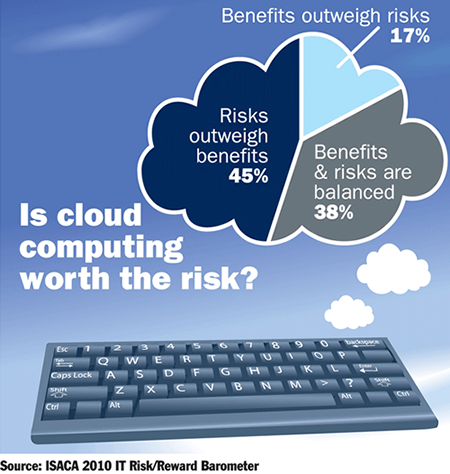 Cloud computing is beneficial to large and small business enterprises who want to revolutionize their IT infrastructures. The business enterprises must understand that there are certain risk factors associated with cloud computing. For instance, recently, there was an outage of Amazon.com and the site collapsed for nearly 24 hours taking with it all its customers including a few small businesses. This shows that cloud computing is not fully risk free. Therefore, if you are running your small business on cloud computing and if the nature of your business is such that an outage cannot be tolerated, then it is imperative that you come with an alternative plan. To mitigate the risks associated with cloud computing, fine comb through the terms and conditions before signing the contract provided by your SaaS Provider. Though cloud computing does not provide a safe haven, we cannot ignore its advantages. Therefore it is wise to take the following precautions before selecting a SaaS vendor.
Cloud computing is beneficial to large and small business enterprises who want to revolutionize their IT infrastructures. The business enterprises must understand that there are certain risk factors associated with cloud computing. For instance, recently, there was an outage of Amazon.com and the site collapsed for nearly 24 hours taking with it all its customers including a few small businesses. This shows that cloud computing is not fully risk free. Therefore, if you are running your small business on cloud computing and if the nature of your business is such that an outage cannot be tolerated, then it is imperative that you come with an alternative plan. To mitigate the risks associated with cloud computing, fine comb through the terms and conditions before signing the contract provided by your SaaS Provider. Though cloud computing does not provide a safe haven, we cannot ignore its advantages. Therefore it is wise to take the following precautions before selecting a SaaS vendor.
Check out the Authenticity of the Cloud Service Vendor – Before approaching a SaaS vendor, get a third party to check out the outages and downtime of the service provider. Also ensure that their services suit your business needs. You can also ask the provider whether they will make a contractual commitment to store and process data to a specific jurisdiction.
Data Security – Remember that, as a small business owner, you are responsible for the security and integrity of your data. When sensitive data is processed outside your premises, there is risk involved. Therefore, it is imperative that you ask your SaaS provider the information regarding the administrators who handle your data. The service providers must be willing to be subjected to regulatory compliance certifications. If they are not ready for external audits, then it is wise to avoid such SaaS providers.
Segregation of Data – In cloud computing your data is stored along with the data of other customers. The data is in an encrypted form and encryption accidents can deliver the data to be unusable. Therefore, ask the service provider about the schemes and designs undertaken for data segregation. Also find out whether the data segregation schemes are tested by professionals.
Data Recovery – It is a fact that you may not know where your data is located. Ensure that your provider has the provisions to restore your data and applications in time in case of a disaster.
Long-term Viability – This is an important question to ask your SaaS provider. In case his/her company faces a problem, how you would get your data? Would the data be in a format that could be easily imported into a replacement application?
Free Document Sharing made easy through Apptivo.
The SaaS service providers generally try to shift the risks to their customers. Therefore, small business enterprises must read the terms and conditions carefully before signing the contract. However, every state in the U.S. has laws to protect the affected small businesses in the event of a security breach. Industries such as healthcare, telecommunications and finance are subjected to additional regulatory laws. Remember that cloud computing is here to stay. Make use of its advantages and at the same time be aware of its risks.


